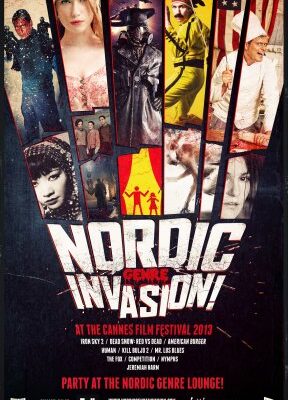So what the hell is ‘cross-media’?
I’m one of the founders at Fourth Wall Studios, the makers of Dirty Work. In the first episode of the flagship show on RIDES.tv, our hero is trying to make friends with a pretty girl in trouble. On your computer screen, you can see the kind, sensitive things he says to her—while on your phone you hear his inner thoughts as he schemes to get her into bed.
Last month we were honoured to receive a Primetime Emmy® for the show and for RIDES.tv, a platform we developed to give audiences a simple, accessible way to create the cross-media content we believe will become as important in this century as films were in the last.
D.W. Griffith and the Cross-Media Revolution
Let’s start by talking about the single most successful cross-media format in the history of entertainment: movies.
More than a century ago, a new piece of technology, the motion picture camera, revolutionised storytelling. Like opera before it, a movie could combine the best of every art form—drama, art, costumes, music—but unlike opera, films were scalable, so you could make a show that people all over the world could enjoy.
Today, there are a lot of buzzwords flying around about the next development in storytelling (cross-media, transmedia, 360) but they all describe a similar phenomenon: a new technology—in this case, the connected information infrastructure of web and mobile devices—that once again revolutionising how stories can be told.
Down the Rabbit Hole with Steven Spielberg
In the fall of 2000, after a decade publishing novels, I got a call about a project Steven Spielberg was working on with Microsoft; something to do with his new movie, A.I. Artificial Intelligence. Dreamworks wanted ‘a real SF writer’ on the project, and recommended me.
The A.I. web project—now nick-named The Beast—was a thunderbolt. Driven by equal parts luck, inspiration and blind panic, we set out with an agenda: bring the story to the audience in every imaginable way. Email, video, websites (thousands of them), phone calls, live events; we even sent faxes. (Remember faxes?) We invited the audience into the story, and like vampires, once they were over the threshold there was no escape from them.
The Beast was Woodstock; a revolution and a rock concert all in one. Over the next few years, we would launch other projects (now called Alternate Reality Games, or ARGs): I Love Bees for Halo 2, the Nine Inch Nails collaboration Year Zero, and the giant Why So Serious? campaign for The Dark Knight. They were events, they were awesome, and then … they were over.
Fourth Wall Studios
The ephemeral nature of the ARG was a problem. In 2007, myself, Jim Stewartson and Elan Lee founded Fourth Wall Studios with a fundamental mission: to define the future of multi-screen story-telling. For that we needed to create a stable, reusable, scalable platform for cross-media stories.
Think back. I Love Lucy really established the basic format of television, defining a repeatable relationship between a show’s creator, sponsor and audience. In the last decade, iTunes similarly established a working format for the next generation of the music industry. Our goal was to make a platform designed to link the screens in your life together to help tell a single story; a cross-media story as easy for an audience to experience as reading a book or watching a film.
We call these cross-media experiences Rides. If you go to RIDES.tv, you will find a rapidly growing catalog of shows, each of which is trying to explore the capabilities of the wired world, whether that means making a show about a telepath (Claire), where the thoughts she hears come whispering across your phone, or allowing the audience to place bets on a story’s outcome, as we do in The Gamblers.
Cross-Media: Do Audiences Even Want This Stuff?
To be clear: if the question is, ‘does a guy sitting in a dark theatre want to get a phone call in the middle of Casablanca?’ the answer is ‘no.’
But ask the broader question: how do we live today? According to Google, TV watchers are simultaneously attending to at least one more device—cell phone, tablet, or laptop—77 per cent of the time. Multi-channel and multi-screen storytelling isn’t coming fast just because we have the technical ability to deliver it, but because this is how we live today.
If your audience is watching your film on Netflix with their phone and laptop open, why wouldn’t you want to engage those devices in telling your story instead of letting them only distract from it?
What’s In It For You?
The next generation of audiences will be consuming entertainment on computers and tablets and phones: devices where they get to click things. They are used to this power; they will expect to use it.
The demand for cross-media content is vastly greater than any one studio could ever hope to meet, and growing every day. At Fourth Wall Studios, our hope is that the RIDES platform can be a tool for other creators—writers, directors, producers and sponsors— who want to figure out how to connect with the audiences of today.
It’s the challenge of every generation to make the oldest stories—love and war, comedy and tragedy—new again. As a creator I feel incredibly lucky to be here, at the beginning of a new age of storytelling. That’s why events like the Power to the Pixel’s Cross-Media Forum, which is held in London every October, are so important; it brings creators, producers and financiers together to explore what’s happening now as well as the fascinating question of What Comes Next? It also gives people interested in the evolution of storytelling a chance to talk to one another, share war stories and meet sponsors and broadcasters who understand that, increasingly, when the world wants to be entertained it goes online.
Indeed, I hope the readers of this article will be inspired to take a look at the tools we are building, get involved in the community that is growing up at events like those orchestrated by Power to the Pixel and join us in the ongoing attempt to re-imagine entertainment for the audiences of today.











